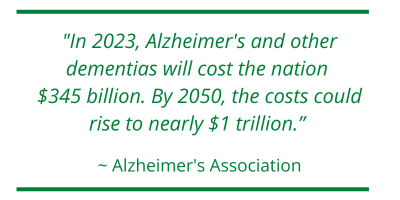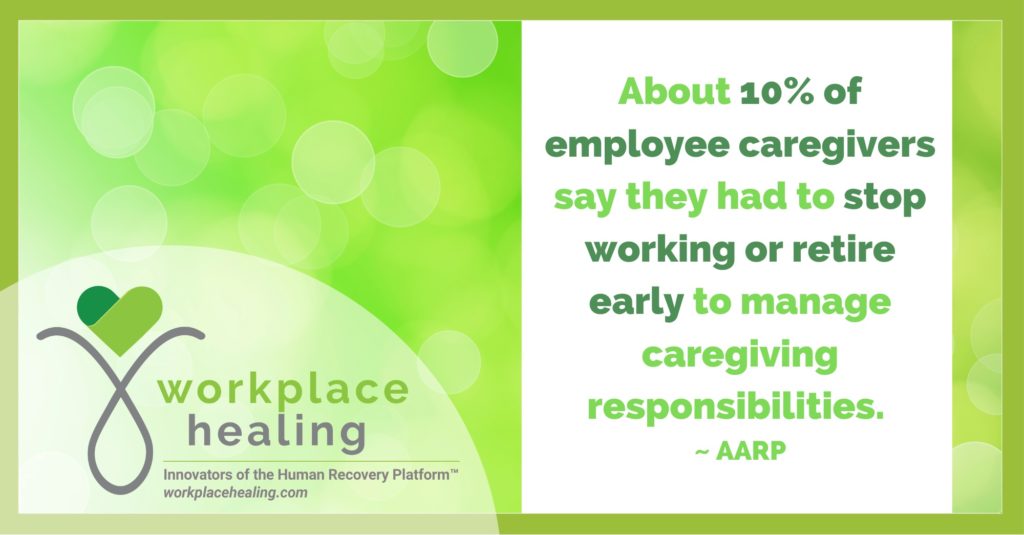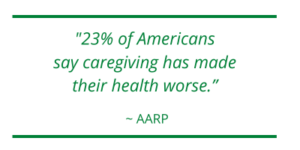
How to Prevent Caregiving from Crushing Employees and Costing Your Company
With a balance of practical and empathetic strategies, you can turn around stagnant job performance and retain valued employees feeling overwhelmed by the demands of caregiving.
When Sharon Davis’s mother was diagnosed with Alzheimer’s, she moved her counseling practice from Oklahoma to Virginia to help care for her mother “in her home as long as possible.” But due to her mother’s needs, Sharon was unable to continue working full-time.
“Caregiving is often so overwhelming and time-consuming, it’s impossible to continue full-time employment. A person’s quality of work will definitely suffer. I was fortunate that we were in the financial position to enable me to do that, but not everyone is,” says Sharon, a licensed professional counselor with extensive experience in bereavement and work-based healing programs for grieving employees. She has helped many people continue to work while caring for a dying loved one or grieving a death.
“My mother died in bits and pieces and stages. It was awful. Every once in a while as the disease progresses, you see the flashback of ‘oh, she’s still in there’ and then it’s gone,” Sharon says, whose mother passed away in 2021.
 According to the Alzheimer’s Association, one in three seniors dies with Alzheimer’s or another form of dementia. Meanwhile, over 11 million Americans are providing unpaid care for loved ones with Alzheimer’s.
According to the Alzheimer’s Association, one in three seniors dies with Alzheimer’s or another form of dementia. Meanwhile, over 11 million Americans are providing unpaid care for loved ones with Alzheimer’s.
“In 2023, Alzheimer’s and other dementias will cost the nation $345 billion. By 2050, the costs could rise to nearly $1 trillion.” ~ Alzheimer’s Association
Of course, Alzheimer’s isn’t the only devastating disease putting pressure on working families. Over the last five years, the number of Americans caring for loved ones has risen to 53 million.
Attempting to seamlessly balance the demands of work and caregiving, employees suffer from high rates of stress, poor health and strained finances. Often, they don’t divulge their struggles to their employers because they fear losing their jobs.
What’s that mean for the workplace? Job performance struggles, retention challenges, disengaged employees, weakening team morale and lost intellectual capital when valued employees eventually burn out and leave.

Strong, skilled leaders who care.
Leadership plays a crucial role in creating a workplace that fosters employee well-being. While most executives acknowledge that employee well-being matters and is a top priority, nearly 90% of employees describe their work life as worsening.
One of the biggest challenges leaders face when managing an employee caregiver is determining how to keep their employee engaged and committed at work. One respondent to a Workplace Healing survey said:
 “It affects the team in terms of cohesiveness and performance. Other people have to take on so much more.”
“It affects the team in terms of cohesiveness and performance. Other people have to take on so much more.”
To best support an employee caregiver while also preserving team morale and productivity, it’s critical to understand what caregivers are typically up against.
1) Isolation.
Isolation is one of the biggest issues facing caregivers. Sharon, who moved her in-person counseling practice to telehealth when she relocated to Virginia to be with her mother, says the isolation was one of the most difficult and stressful parts of caregiving, especially as Alzheimer’s caused her mother to become uncharacteristically violent.
“I couldn’t go to my patients and tell them my mother—who had never hit me in my life—had hit me with her cane,” Sharon says. “When you’re dealing with an employee in a caregiving situation like that, you need to be aware of what they’re confronting when they go home.”
Instead of assuming your employee is okay because they aren’t discussing their caregiving responsibilities, take time to check in with them. Ask them what they need.
“When in doubt ask instead of just assuming you know what they need. It’s going to be individual from one employee to another,” Sharon says.
If your employee gets emotional when you talk with them, don’t try to “fix” their feelings or tell them it will be okay. Simply sitting with them and listening is a healing and supportive form of connection.
Also, make them aware of other channels like caregiver support groups in the community. If a group meets during work hours, offer flexibility in the workday to help your employee attend.
2) Guilt.
Many people who are caring for ailing loved ones often feel like they’re never doing enough, or they blame themselves when something goes wrong with their loved one.
“Guilt is absolutely huge. You always feel like you’re doing the wrong thing or not enough. Caregivers may feel like they’re neglecting their other family members if they’re married or have children. Caregiving takes a significant chunk of time and that gets even more complicated when you’re trying to work,” Sharon says.
Caregivers are often faced with unexpected calls that demand their immediate attention, pulling them off of assignments. “I know from my personal experiences with my parents how much distraction there is when you’re a caregiver,” said a Workplace Healing survey respondent.
For many caregivers, work can be a welcome respite from caregiving. Help manage guilt and overwhelm by going through work projects together and deciding what assignments are most pressing and which ones can be tabled for later or delegated.
If your employee struggles with constant phone calls or interruptions in an open-concept office, provide a quiet conference room or office space for them to concentrate for a period of time. Also, determine if a hybrid option (working from home some days and from the office on other days) makes sense for your employee.
3) Neglect self-care.
With burgeoning responsibilities, caregivers are less likely to prioritize self-care practices which affect their overall well-being, including their ability to focus at work. Unmanaged stress weakens the immune system, increases the risk of anxiety and depression, affects sleep and can lead to chronic health problems.
 “23% of Americans say caregiving has made their health worse.” ~ AARP
“23% of Americans say caregiving has made their health worse.” ~ AARP
Caregivers are twice as likely as non-caregivers to develop chronic illnesses like diabetes and high blood pressure, twice as likely to struggle with depression and overwhelmingly report elevated levels of stress.
Self-care is an essential part of successfully caring for others. If a caregiver isn’t taking care of their own needs like getting exercise, eating nutritious meals or taking time to relax, they become less effective in all areas of their life. While that can sound easier said than done, effective self-care can happen in 5 to 10-minute intervals throughout the day.
Here are a few ways you can promote employee self-care:
- Encourage your employee to take breaks throughout the day whether for lunch, a walk outside or to simply stand up, stretch and breathe.
- Provide flexibility during the day to accommodate personal appointments like annual wellness exams, counseling and support groups.
- If your employee is having a particularly hard day, ask them if it would help them to go home a little early to rest and recharge.
- Periodically, bring in a chair massage therapist to offer 15-minute massages to your employees.
- Don’t forget laughter is a natural stress reliever. Office lunches with colleagues and lighthearted conversations can offer a welcome diversion.
How much is grief costing your company?
 Death of a loved one, caregiving, illness, injury, divorce and career transitions are common life disruptions that cause grief.
Death of a loved one, caregiving, illness, injury, divorce and career transitions are common life disruptions that cause grief.
Employees who don’t receive the support they need at work are at higher risk for quitting, absenteeism, and presenteeism, which cost companies billions in lost productivity. Find out how much grief is projected to cost your company this year with our free Grief Forecast™.
A leadership solution that works.
Emotional intelligence and empathy are essential leadership skills that can be developed. Learn how the Human Recovery Platform™ can help you transform the way you support grieving employees and effectively enhance productivity, retention and morale.
